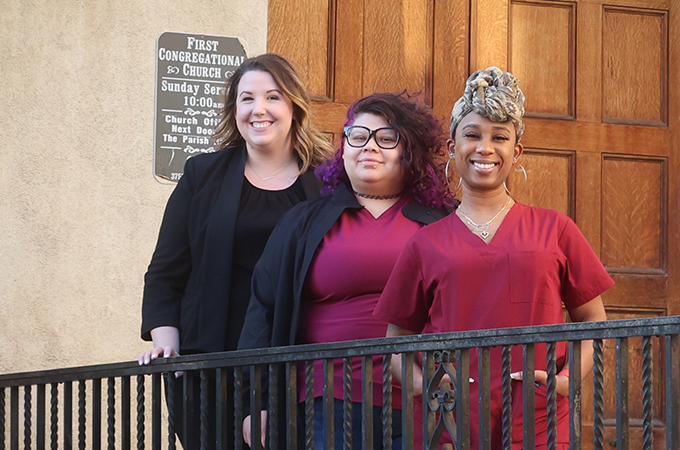At the University of Redlands School of Education, the Master of Arts in Clinical Mental Health Counseling (CMHC) degree program provides graduate students with a learning experience that empowers them to embark on careers that serve others. Thanks to supervised clinical experiences tailored to their career goals, graduates also have the opportunity to provide culturally responsive mental health counseling and consultations.
Eight years ago, the department partnered with the Riverside Free Clinic, a nonprofit organization that provides free interdisciplinary health and wellness care to the underserved populations in the Inland Empire while also serving as an effective training environment for future healthcare professionals and leaders. The biweekly clinic is run by volunteers that provide patients with free medical, dental, counseling, psychiatry, and optometry services.
To gain professional experience, U of R CMHC students provide counseling support in a variety of areas, including managing drug and alcohol use, depression, anxiety, grief and loss, anger, life transitions, and difficulty coping.
“We are committed to giving students the type of clinical training which will prepare them to practice from a social justice advocacy perspective,” says Professor and CMHC Department Chair Conroy Reynolds. “The whole basis of the clinic is driven by a commitment to access. We want our students to adopt that perspective and to be trained in the field.”
Giving back to the community
Under the supervision of Alexandra Moreland ’11, ’14, student clinicians serve around a dozen walk-in patients every other week and offer in-person sessions and a telehealth option for off-site patients.
“I wanted to work with students who are going through the same training program that I did,” Moreland says of her decision to get involved in the clinic. “Being able to train and connect with students who want to go into the clinical counseling profession, while also providing services to the population that often doesn't have access to mental health support, is a way for me to give back to the community.”
Moreland has been the students’ clinical director and supervisor for a year and a half, a role she assumed when clinic operations had moved to a virtual format because of the COVID-19 pandemic. As of April 2021, the clinic has returned to offering in-person services, and Moreland provides students with guidance on crisis management, education on diagnostics and treatment plans, and surveys the quality of session notes and documentation.
Amidst it all, she emphasizes the importance of being able to help people who don’t usually have access to care: “People who are suffering may not have the ability to speak with someone. If we can be a part of removing the barrier to care, that’s moving the entire profession and mental healthcare workers forward. We’re looking at it from a social justice perspective,” she says.
In addition to her work at the clinic, Moreland is the lead therapist for the youth partial hospitalization and intensive outpatient programs at the Loma Linda University Behavioral Medical Center. Being able to work with different populations is part of what attracted her to a career in mental healthcare in the first place.
“Mental health and psychology look at the whole person,” she says. “I love working in a field that appreciates emotional, physical, and spiritual wellbeing and all of the things that make us who we are. The most rewarding aspect of this work is being able to be a part of the healing process.”
Gaining real-world experience
Jessica Terrell ’22, one of the student clinicians who works under Moreland, uses her past experiences to inform her approach to delivering mental healthcare at the clinic. After two of her family members unexpectedly passed away when she was a teenager, she sought therapy to learn how to navigate her feelings and begin the healing process.
“I remember going through that grief and not having the proper resources,” she says. “As an African American woman, I knew that going to therapy or receiving mental health services was frowned upon. But as I got older, I knew that my grief was affecting me and thought it was important to seek therapy.”
Terrell’s experiences in therapy led her to pursue a career in counseling and she has been seeing patients at the clinic since May 2021. Now that services are offered in a hybrid format, students work with nearly a dozen patients virtually while also facilitating in-person sessions.
The benefit of this format is twofold—if they prefer, patients can receive care from home, and student clinicians are building a new skillset by working with telehealth technology. Without sitting face-to-face, clinicians cannot rely on many of the cues that are important aspects of the traditional psychotherapy model, such as evaluating body language, not to mention technological issues that can occur. Still, Moreland and the student clinicians view this challenge as an opportunity to grow.
Terrell says that working alongside Moreland has been an invaluable learning experience. “Alex gives us the tools and support we need to become better clinicians—when we ask questions, she takes the time to walk through the answer with us,” she says.
In working at the clinic, Terrell sees a direct line between what she learned in the School of Education and what she sees during her sessions with patients. As she continues to acquire skills while delivering care firsthand, Terrell is grateful for the foundation she laid at Redlands.
“I’m learning so much,” she says. “Through taking various classes and talking to professors, I can identify what I’ve learned in my work and see how it allowed me to grow."
Learn more about the School of Education.






